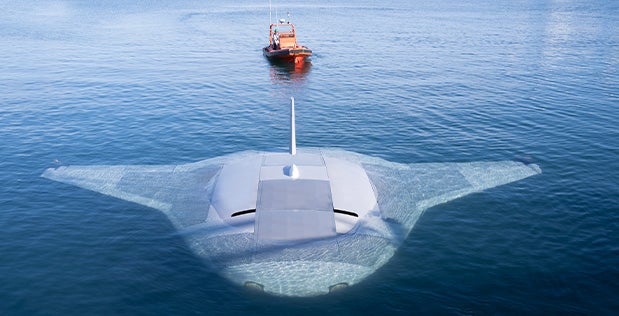US tests giant ‘Manta Ray’ drone submarine for long-distance underwater missions
The ‘manta ray’ submarine is designed to operate over long distances of water and deliver pay loads to targets

Your support helps us to tell the story
From reproductive rights to climate change to Big Tech, The Independent is on the ground when the story is developing. Whether it's investigating the financials of Elon Musk's pro-Trump PAC or producing our latest documentary, 'The A Word', which shines a light on the American women fighting for reproductive rights, we know how important it is to parse out the facts from the messaging.
At such a critical moment in US history, we need reporters on the ground. Your donation allows us to keep sending journalists to speak to both sides of the story.
The Independent is trusted by Americans across the entire political spectrum. And unlike many other quality news outlets, we choose not to lock Americans out of our reporting and analysis with paywalls. We believe quality journalism should be available to everyone, paid for by those who can afford it.
Your support makes all the difference.The US has tested a futuristic “manta-ray” style underwater drone that could one day be used for long-distance missions around the world.
The Manta Ray prototype uncrewed underwater vehicle (UUV) completed full-scale testing off the coast of Southern California over the last three months.
It was funded by the US Department of Defense’s Defense Advanced Research Projects Agency (Darpa) programme, and built by defence company Northrop Grumman.
Once developed, it will demonstrate a new class of long-range, payload-capable UUV’s ready for operation across seas and oceans, according to Darpa.
It moves through the water using “efficient, buoyancy-driven gliding” and could reduce the need for as much human involvement in underwater missions.

Darpa programme manager for Manta Ray Dr Kyle Woerner said: “Our successful, full-scale Manta Ray testing validates the vehicle’s readiness to advance toward real-world operations after being rapidly assembled in the field from modular subsections.
“The combination of cross-country modular transportation, in-field assembly, and subsequent deployment demonstrates a first-of-kind capability for an extra-large UUV.”
Northrop Grumman said the prototype was built in Maryland before being shipped in sections to its test location in California.
The demonstrated ease of shipping and assembly supports the possibility of rapid deployment throughout the world without “crowding valuable pier space at naval facilities”.

“Shipping the vehicle directly to its intended area of operation conserves energy that the vehicle would otherwise expend during transit,” added Dr Woerner.
Darpa said it is engaging with the US Navy on the next steps for testing and transition of the technology. UUV’s have existed since the 1950s.
Also known as uncrewed underwater vehicles and underwater drones, they are submersible vehicles that can operate underwater without a human occupant.
In September 2021, researchers at a Chinese university developed a manta ray shaped UUV with the purpose of collecting information around the contested Paracel Islands.
Join our commenting forum
Join thought-provoking conversations, follow other Independent readers and see their replies
Comments